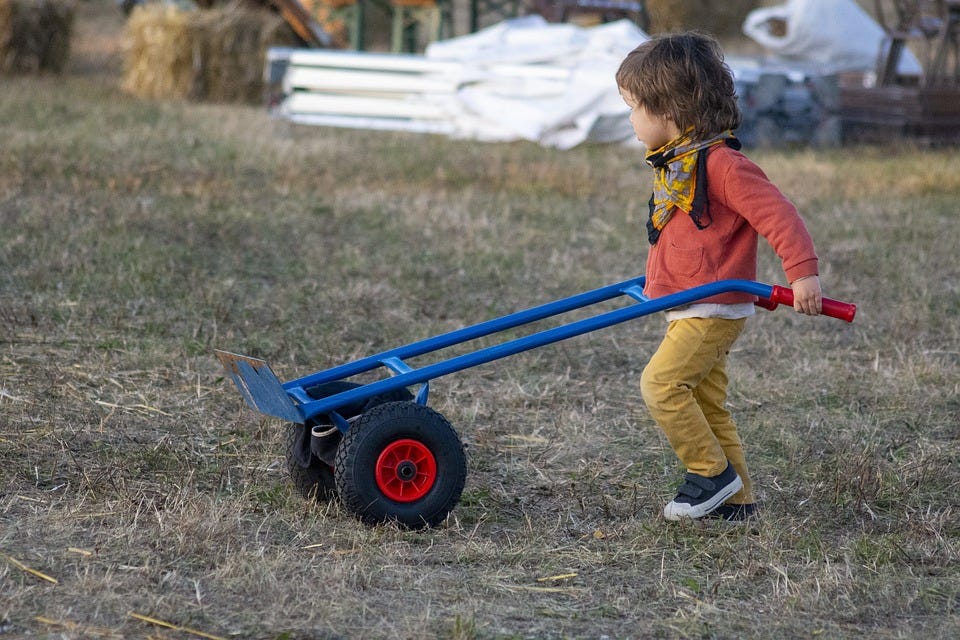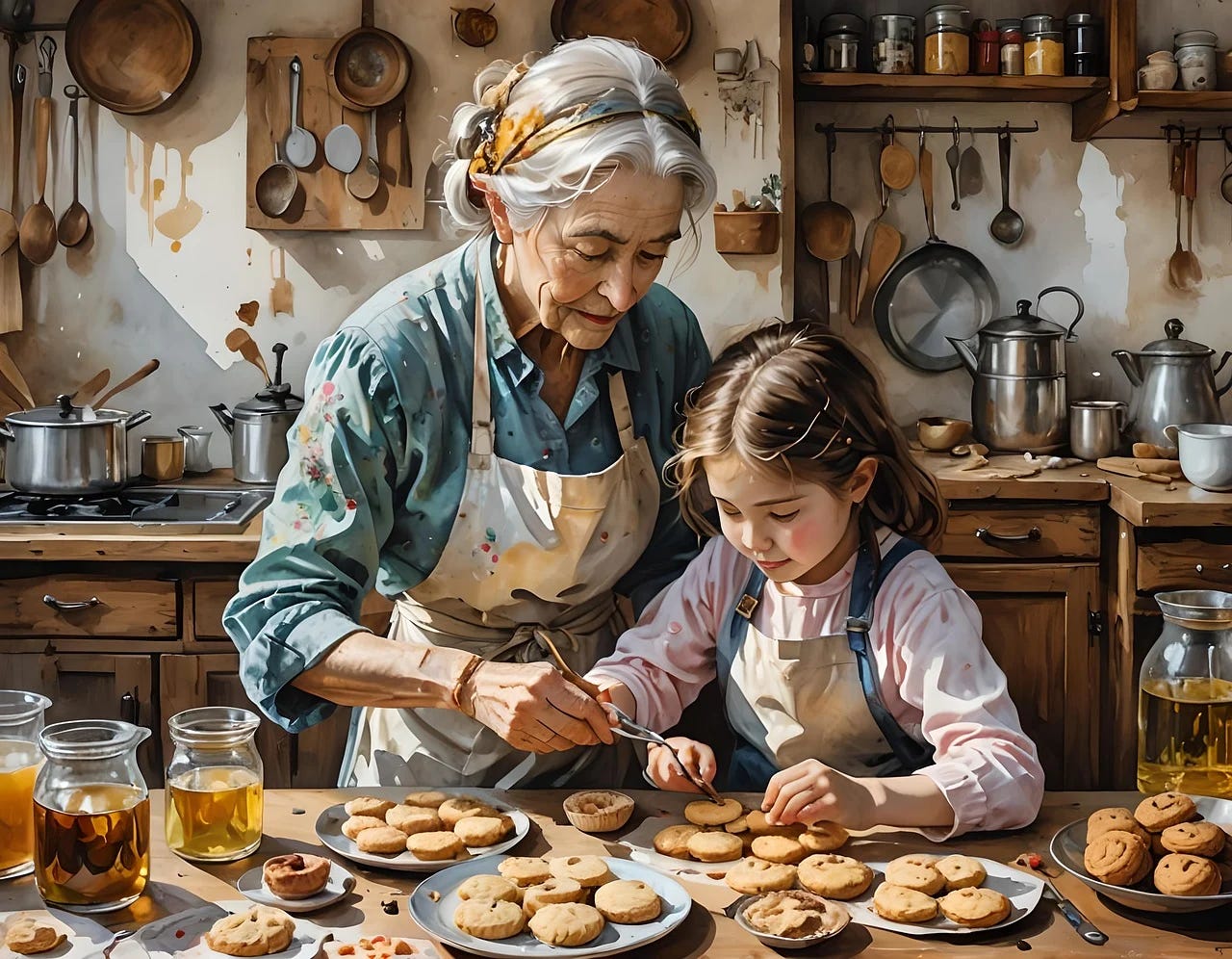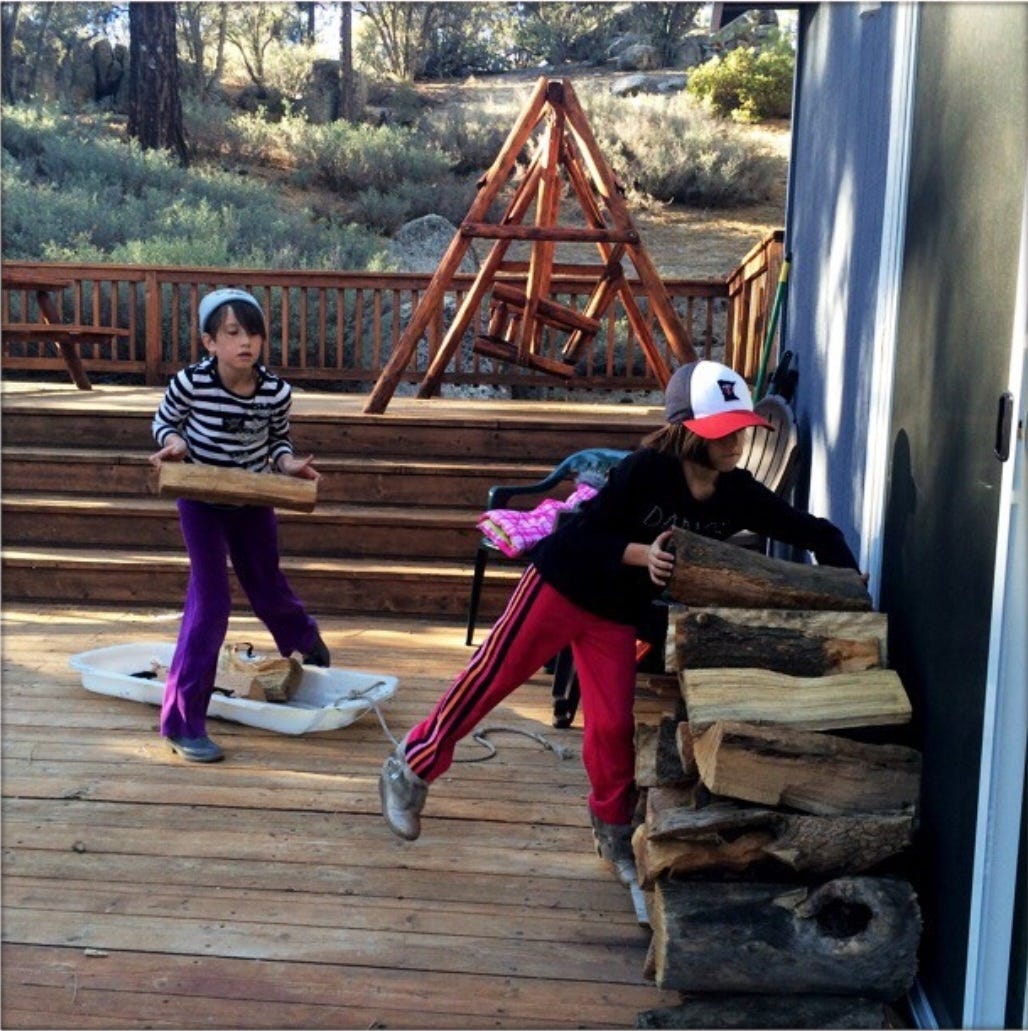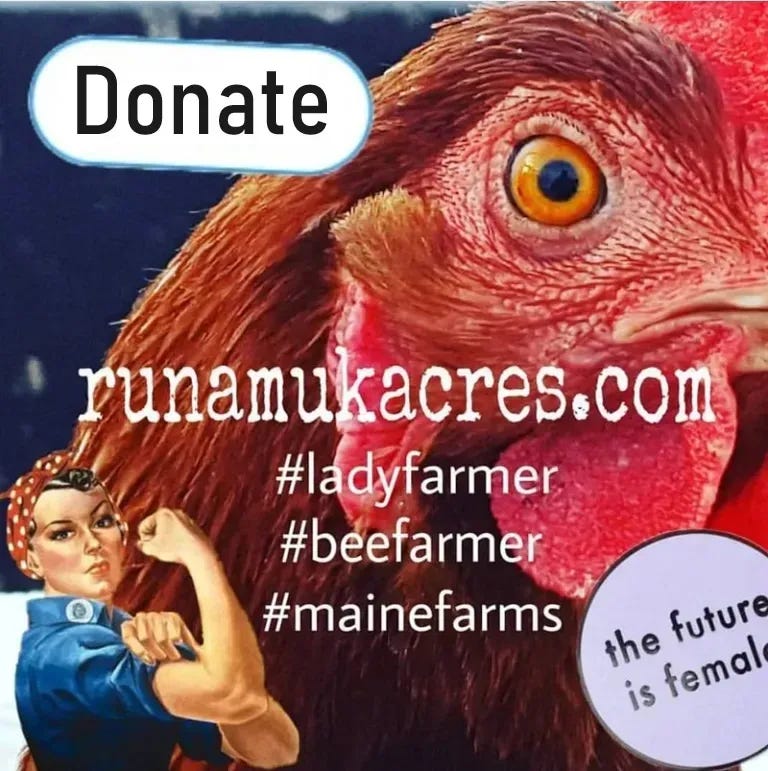Unmasking Convenience: The Perils of an Industry Driven Society
Our own creativity and industriousness has incapacitated us and if we do not act, we will end up just like the people from Wall-E…
Lazy is a dirty word in my household. In fact, I have a huge beef with convenience and industry in general. There’ve been too many instances in my life when those around me have shied away from a project because we were missing a specific tool and without it the job was too labor intensive for their taste. Certainly, as a solo lady-farmer I would not have made it even half so far had I allowed those people and obstacles to stop me. Yet, the mindset of convenience is pervasive in our industry-driven society and I would caution you against getting too comfortable.
Welcome to the Runamuk Acres Conservation Farm! We’re an ecologic reserve promoting wildlife conservation through methods of regenerative agriculture. If you’re new here, I invite you to check out my About page to learn what this is, who I am and why I am doing this. Or just dive right in! At “Runamuk Acres” you’ll find the recantings of one lady-farmer and tree-hugging activist from the western mountains of Maine. #foodieswanted
Man has long prided himself on his own intelligence and ingenuity. With every new discovery or invention we’ve celebrated our own creativity and industriousness. Fire, tool-making, bread-baking, building techniques and advances in agriculture and medicine are all highly celebrated achievements. Long before the advent of the Industrial Revolution we accomplished great feats without so much as an electric drill to do the job, yet when faced with the simple task of planting a garden there are those would wouldn't think to tackle the job with only a shovel and a hoe.
The Perils of an Industry-Driven Society
I often wonder, however, if we’re not just a little too clever for our own good. It’s a worry that has only grown since I took the job of Head Cook at the local elementary school.
If you missed it, check out this recent farm-update for the scoop on that story:
It came as something of a shock to see the highly processed heat-and-serve foods our educational institutions are providing children today. It’s a far cry from the largely homemade fare we had when I was in school thirty-plus years ago. This is so the district can save money by keeping as few cooks in the kitchen as possible, while still being able to say they’re feeding students.
Industry has grown and expanded to infiltrate every part of our existence, making life easier and more convenient, while at the same time robbing us of the very essence of our humanity. Our own creativity and industriousness has incapacitated us and I fear if we do not act, we will end up just like the people from Wall-E…
In the movie, humanity spends the entirety of their lives in hover-chairs with holographic screens in front of their faces. They’re ignorant from a lack of working experience, as demonstrated by the captain’s misconception that he can grow pizza from a plant. Humanity has become so debilitated they can’t even roll over or stand, and all their meals come to them in a cup.
Fake Food
This all came to mind recently, when I saw
’s post about food pouches and fake food:Apparently, sales of baby food pouches have increased some 900% over the last decade, becoming the most popular baby food on the market. What’s more, food pouches are marketed to the parents of toddlers and older children, prolonging pureed food-eating by years.
As Tim says, “Kids aren’t even learning to eat real food anymore.”
Dr. Mark Corkins, pediatric gastroenterologist at the University of Tennessee Health and Science Center said he:
“sometimes sees children who are so reliant on the smooth, sweet taste of pouches that they’ve developed food and texture aversions and refuse to eat regular fruits and vegetables.”
Doctors and nutritionists are raising concerns that an over-reliance on pouches can interfere with nutrition, long-term food preferences, dental hygiene and speech and language development.
This is a prime example of the perils inherent in our modern technologies. Modern convenience makes things too easy for us. Humanity is becoming lazy and debilitated.
We need to chew to develop the muscles for speaking.
Just as we need to work to exercise our muscles and develop our brains, our creativity and intelligence. The rise of technology and industry has brought profound changes in how people live, allowing humanity to grow and prosper in many ways, and yet that industrialization comes with insidious consequences.
In fact, some scholars have even surmised that elements of modern technology may have caused human evolution to slow or stop altogether.1
This is a prime example of the perils inherent in our modern technologies. Modern convenience makes things too easy for us. Humanity is becoming lazy and debilitated.
What Message are We Sending?
What message are we sending when life becomes more about convenience than experience? Do you really want to be known as someone who takes the easy way out? A species of lackadaisical creatures who only exist to consume, clutter and destroy their planet?
If you’ve been following me for very long, you’ve probably heard me say this before, but I’m going to say it again: There are some things I am happy to allow industry to manage for me, like the production of toilet paper. But food is not—and should not—be one of them.
Food and cooking are one of those skills that are uniquely human. No other species on the planet cooks or creates with their food. It defines cultures and has the power to bring people together in the most profound way.
Food is love.
What message are we sending to our children when food becomes something that a) has negative effects on our long-term health, and b) robs us of the opportunity to work, create, and care for the people around us?
Just because we can, doesn’t mean we should.
In the movie Jurassic Park, Jeff Goldblum plays a statistical scientist by the name of Ian Malcom, who gravely confesses:
“The lack of humility before nature that’s being displayed here staggers me.”
To which, Richard Attenborough’s character, the wealthy and eccentric John Hammond, replies:
“Now, hold on—I don’t think you’re giving us our due credit here. Our scientists have done things which nobody’s ever done before.”
Goldblum’s character counters:
“Yeah, but your scientists were so preoccupied with whether or not they could—they didn’t stop to think about if they should.”
And that’s the thing, folks—just because we can make all of these wonderful things to make work easier or to avoid the work altogether—doesn’t mean we should.
Just because feeding toddlers is messy business, doesn’t mean you should feed them with food pouches. And just because you don’t have “the perfect tool” for the job, doesn’t mean you shouldn’t do the work anyway.
By allowing industry and convenience to do everything for us, we rob ourselves of the opportunity to truly live and experience life on this extraordinary planet we’re fortunate enough to call home.
Sure, it’s a little more work to make muffins from scratch, or to plant that garden without a tiller, but the rewards far surpass the hassles.
Work is NOT a Dirty Word
Work should not be a dirty word, but a gift. A blessing and celebration of our existence, and our humanity.
When we work, we’re using our bodies—our muscles and our brain—stimulating our many nerves and cells. It’s good for both our physical and mental health. Work is good for you, and it’s good for your children, too.
You can tailor the project to suit your own unique existence when you’re willing to put in the time and energy to DIY a project. Maybe you like less sugar in your muffins, or you want to avoid the preservatives that come in the boxed mixes. Or perhaps, you just don’t have the money to buy a tiller or to pay someone to come till the plot for you—that doesn’t mean you shouldn’t be able to have that garden!
I think a lot of folks will argue that they don’t have the time to cook for themselves and their families. They don’t have the time to take on their own home improvement projects, or the skill to make their own gifts to give at Christmas. It’s easier to buy frozen foods to heat and serve, or to spend money with Amazon to have gifts delivered directly to their doors.
Yes, it’s easier. Industry has made it so easy for us for the simple reason that they want our money. They’ve got us very effectively trapped in their industrialized and corporatized system. Life has become too easy and we’ve become lazy as a result.

By allowing industry and convenience to do everything for us, we rob ourselves of the opportunity to truly live and experience life on this extraordinary planet we’re fortunate enough to call home.
Industry Wants Us to Think We’re Incapable
Folks will say they need the money, and I’m sure in some cases this is desperately true. Sometimes it’s all we can do to survive, and to those people I say: do what you must to save yourself. I’ve been there.
However, there are too many others who have simply been roped into the system created by industry. A system that self-perpetuates the rampant consumerism driving our society, while leading us to believe that we’re too stupid to make our own muffins, plant our own gardens, or educate our own children.
In my twenties, during my stay-at-home-mom era, I discovered the insidious truth about the nature of schools and society when I stumbled upon the works of John Gatto. I wrote a little bit about that in my recent post which you can read here:
It’s a system that has no qualms about filling those easy, frozen foods with preservatives because those preservatives make people sick, which sends them to the doctors’ office. There, people are duped into prescription medications that, again, put money in the pockets of corporations, while simultaneously keeping us trapped in their system and dependent upon the industry.
Our industry-driven society is a system of credit and debt, and fake monies, that keeps us on the proverbial treadmill, always chasing that paycheck to keep the wolves at bay.
Industry wants us to think we’re incapable, that these things are too hard or too much work for us to take on ourselves—so that we’ll give them our hard-earned money to have them do it for us. BUT, if we’re willing to re-prioritize our lives, we can do more for ourselves.
If we decided we’re not going to buy the latest and greatest flatscreen TV, that new car or truck or the zero-turn lawn mower for our postage-stamp lawn... If we decided to reject the idea that we need more stuff to clutter our homes or landfills. If we opted to reject the consumer mentality and instead became producers—I suspect that would free up a lot of money for most of us.
Not to mention time we could be spending with our families…
I Want to Live!
We still have the power to determine our own individual and unique priorities within our own lives. If we decide we’re going to be more selective of where our money is going and who is getting it, that could potentially free someone up from having to work so many hours. In turn, that freed up time could enable you to make more meals from scratch, pursue new hobbies, or spend more quality time with your loved ones.
The opportunities are limitless, really. It’s all about being intentional with your time, energy and money—and taking responsibility for our own lives.
The climax scene in WALL-E finds Captain McCrea up against AUTO in a fight for control of the ship. Having found proof of life on Earth, McCrea wants to return to Earth, but the ship’s auto-pilot programming has a secret directive against it.
McCrea protests:
“Out there is our home. And it’s in trouble. I can’t just sit here and do nothing. That’s all I’ve ever done! That’s all any of us has ever done!”
Auto replies:
“You will survive.”
To which McCrea declares:
“I don’t want to survive! I want to live!”
Yes. You can survive within the industrialized system corporations have created for us. But what kind of life is that?
If I could persuade anyone to do anything, it would be this:
Embrace the work. Don’t shy away from the hard stuff.
And this is something I tell my son all the time: The hard stuff doesn’t get easier by not doing it. Things only get easier when we practice, build muscle and stamina, experience and skill.
This is your life!
For all we know, this is our one and only chance at existence. We should all be living it to the fullest and that means experiencing and doing things for ourselves. It means learning and growing into the truest version of ourselves that we can possibly be and teaching our children to do the same.
When we allow industry to do the work for us, we allow them to rob us of that opportunity. I say, do whatever it takes to re-prioritize your life so that you can do more for yourself. Make those muffins. Plant that garden.
Start small. Take it in baby steps. You got this.
Sending light and love to you and yours.
Your friendly neighborhood farmer,
Sam
Thank you for following along with the story of this lady-farmer! It is truly a privilege to live this life serving my family and community, and protecting wildlife through agricultural conservation. Check back soon for more updates from the farm, and be sure to follow @RunamukAcres on Instagram or Facebook!










Good cautionary essay here Sam. 👏
I believe most of us are designed to conserve energy and resources for future periods of lack/want. There is survival value to that. But the convenience industry hijacks that program by taking away effortful muscle work, and soon even mental/cognitive work (i.e. thinking). Weaker and dumber we will become. What could possibly go wrong?! 😖
Thank you for the mention in this fantastic and well-thought-out post!
“Do you really want to be known as someone who takes the easy way out?”
No I don’t! And I don’t think most people do. But they don’t think it through and realize the truth of the situation. We need to keep talking about this stuff, and hopefully spark curiosity and conversations.